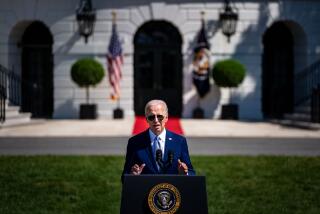Rival stimulus plan gains key support
WASHINGTON â An alternative economic stimulus package picked up momentum in the Senate on Wednesday with new GOP support, potentially complicating the bid to quickly pass legislation to pump billions of dollars into the ailing economy.
The Senate economic package -- which would offer lower rebates than the House version but send them to many more Americans -- won a 14-7 bipartisan nod in the finance committee.
After Iowa Republican Charles E. Grassley, the committeeâs ranking member, endorsed the measure, two other Republicans joined him. All 11 panel Democrats backed it.
The proposal could come up for debate in the Senate as soon as today as an alternative to a House plan that passed with overwhelming bipartisan support Tuesday.
The Senate plan, drafted by finance committee Chairman Max Baucus (D-Mont.), would offer rebate checks to nearly all but the wealthiest taxpayers and would pump approximately $193 billion into the economy over the next two years. It would cost the Treasury $152 billion over the next decade, according to the Joint Committee on Taxation.
Its centerpiece is a proposal to send $500 rebate checks to individuals, including senior citizens and many upper-middle-class taxpayers who were excluded in the House legislation. Couples would get $1,000, and parents would get $300 for each child. Individuals with incomes of more than $150,000 or couples with incomes of more than $300,000 would be ineligible for the rebates.
The measure would extend unemployment benefits by an additional 13 weeks, reflecting the desire of many Democrats to provide more assistance to those who have lost their jobs in the economic downturn.
Baucusâ plan also includes a package of temporary tax breaks for businesses.
Under the House plan, approved 385 to 35, single filers would get a $600 rebate that would begin phasing out for taxpayers earning more than $75,000. Married couples would get $1,200; that rebate would start to phase out at $150,000. Parents would get $300 for each child.
The House bill also includes business tax breaks and a large one-year increase in the size of mortgages that can be backed by the government, making it easier for homeowners to refinance into more-affordable mortgages.
It would inject an estimated $161 billion into the economy over the next two years and cost the Treasury $117 billion over the next decade, according to the Joint Committee on Taxation.
Baucusâ decision to offer his own economic stimulus legislation has drawn criticism from House leaders, as well as the president and his GOP allies in the Senate. They have urged swift approval of the House bill, a compromise worked out between the White House and House leaders.
Several GOP senators repeated that plea Wednesday and voted against the Baucus measure in committee. President Bush, in Torrance to promote his trade agenda, said, âIf youâre truly interested in dealing with the slowdown of the economy, the Senate ought to accept the House package, pass it, and get it to my desk as soon as possible.â
But Grassleyâs backing provided a crucial Republican endorsement for the Senate alternative. âThis is a big improvement,â he said, hailing the measure as important âbipartisan middle ground.â
The income caps excluding the wealthiest taxpayers from getting rebates -- which were not part of Baucusâ original plan -- may also help bring in Democratic support. Many Democratic lawmakers had expressed concerns that sending checks to millionaires would do little to help the economy.
Baucus and Grassley urged the Senate to quickly pass their bill. âThis cannot be loaded down . . . or it is likely to sink,â Grassley said.
But like the House measure the two senators are seeking to augment, their plan may also be altered.
Senators in recent days have proposed a host of additions, including billions of dollars for public works projects, home heating assistance and housing aid. On Wednesday, the finance committee added a tax package to promote renewable energy and a tax refund for the coal industry for export taxes found to be illegal.
If the Senate approves its own economic stimulus plan, it will have to be reconciled with the House version before it is sent to the president, which could delay its enactment.
Senate Majority Leader Harry Reid (D-Nev.) has said he wants to complete work on the package by Feb. 15. Rebate checks would not arrive until May.
--
More to Read
Get the L.A. Times Politics newsletter
Deeply reported insights into legislation, politics and policy from Sacramento, Washington and beyond. In your inbox three times per week.
You may occasionally receive promotional content from the Los Angeles Times.











